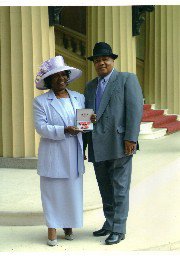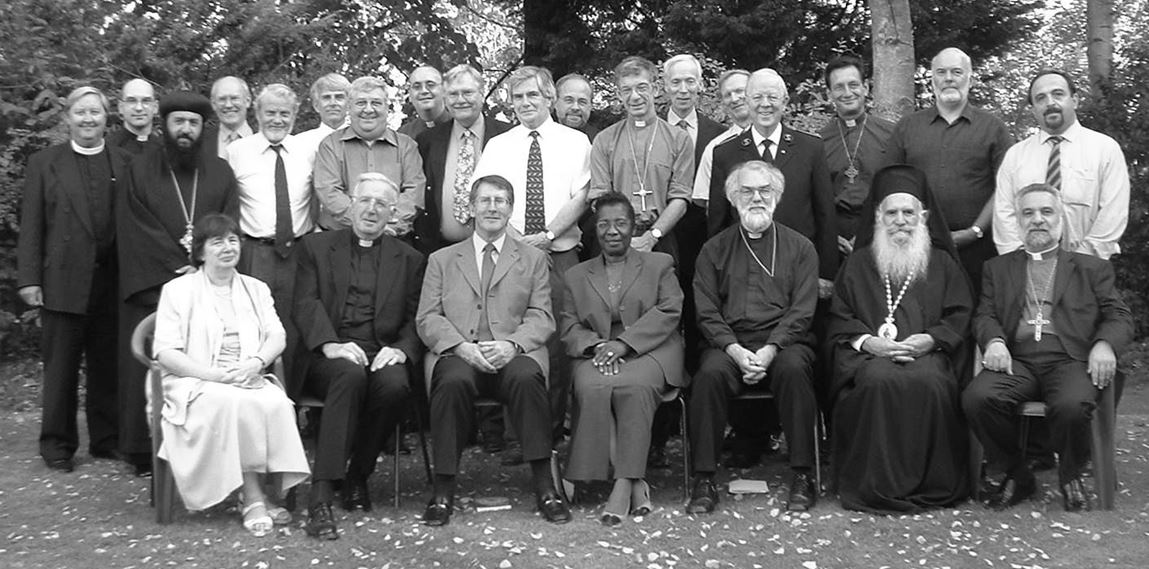Bishop Esme Beswick, one of CTE’s Presidents from 2002-2006, has recently celebrated her 50th anniversary of Christian ministry.
She spoke with CTE’s Lucy Olofinjana in August 2019 about her passion for church unity, her Pentecostal ministry and her decades of ecumenical engagement…
The overwhelming sense you get from speaking with Bishop Esme is that she is a disciple of Christ, full of confidence in who God has made her and what He has called her to do.
Growing up as the only sister of seven brothers, Bishop Esme says she models her life and faith on her father who had great devotion to Christ. He was an Anglican lay preacher, and later Pentecostal minister, in Jamaica. The family gathered each Sunday morning at 6am for family prayers, and her father influenced their whole village as well as instilling great love and confidence in his children.
Confident and full of faith
When Bishop Esme arrived in England in 1961 – for what she thought would be a period of just five years – she brought this confidence and strong faith with her, determined to be a devoted person for the kingdom of God.
“When I came to Kent to train as a nurse, I became very serious about my salvation and Christianity. I knew it was important to believe in Jesus Christ, to search the Scripture myself, so eventually I went to bible school and studied liberation theology. I wanted to understand what it means to be a Christian, not only in words, but in actions.
“I try to exemplify the Christ-like image in this world – to really set my life agenda and become a disciple – I just want to exemplify Christ.”
A Pentecostal minister
Bishop Esme explains how she didn’t set out to become a Pentecostal minister, “I just wanted to help people, to bring some wholeness to people’s lives, and to do that needed to know about the Scripture. The call of God became evident in my life, and I had to stand up and declare who I am in Christ.”
Bishop Esme has been a leading figure in the New Testament Assembly church, alongside her work in the Joint Council of Churches for All Nations which she founded. And for the last four years she has been Bishop of Nebaioth Prophetic Church in London.
Speaking of the challenges of ministering at a time when many opposed women in leadership, as well as the blatant racism in British society during the 1960s and 70s, she repeatedly says “I wasn’t fazed. There were challenges, but it didn’t faze me.”
Ecumenical engagement
It was the Brixton riots in the early 1980s which first led to Bishop Esme’s involvement in national ecumenical work. As the vice-chair and later the chair of the Brixton Council of Churches at this time, she explains: “When there was a standoff in the Brixton riots between black and white, God used me then, in the privileged position as chair of the Brixton Council of Churches, to bring about understanding and cohesion between various cultures.”
“Following the riots in 1985, the British Council of Churches joined us at a meeting in Brixton with the churches, community police and politicians as we sought to bring the community together. I was then invited to be involved with the British Council of Churches (BCC)”.
As well as being a Borough Dean in Lambeth in the 1990s, Bishop Esme’s ecumenical involvement has included meeting the late Pope John II at Canterbury Cathedral and joining a delegation sent to Russia. She was also a member of the British Council of Churches committee in 1990, when Churches Together in Britain and Ireland (CTBI) and the four national ecumenical instruments were created, and was part of the new Churches Together in England (CTE) committee when it was first founded. Speaking of this transition which took place in the 1990s, Bishop Esme says: “Catholics were now enabled to become full members of CTE, rather than just having observer status as they did with BCC – it was wonderful.”
A pioneer
Sharing about her time as a CTE president from 2002-2006, Bishop Esme says “It was really challenging, but also very rewarding. I was able to speak at many different churches, including the Anglican Communion in Nottingham, and take part in national events such as the Queen’s Golden Jubilee at Windsor Castle.”
“I was also signatory to the first CTE Presidents covenant, signifying our work together as the churches in England – this was a historical occasion, and an important part of my ecumenical work.”
While Bishop Esme challenges the label ‘first black female president of CTE’, she acknowledges the pioneering role she had as both a female and a person of Jamaican descent.

“Working with the catholic cardinals and four Archbishop of Canterbury, they accepted me for who I am, not because of my pigmentation or my gender, but because of what I have to offer.”
With the confidence instilled in her from childhood shining through, she adds: “I don’t go into a room or church and think that anybody there is better than I am – I walk in wherever I might be with the mindset that I am well able to do all things through Christ who strengthens me.”
Unity is key
“We all have something to offer, and as Christian denominations we are all in this together. We need to work together for the good of humanity – that’s our mission.”
“Christ is all and in all – God’s Spirit dwells in His people, there is no bond nor free. While some in the past thought that the Spirit was only for the Pentecostals, I understood that the body of Christ is so diverse – we cannot limit the presence of God, He moves in true believers.”
“God doesn’t need labels. He deals with our heart and how much we are devoted to his precepts.”

Celebrating how Pentecostals have become increasingly involved with CTE, Bishop Esme particularly commends the work of Bishop Joe Aldred, CTE’s Principal Officer for Pentecostal & Charismatic Relations.
“I thank God he has allowed me to be an example to fellow Pentecostals, to say we’re not supposed to stay outside and not participate. My stance has helped to influence the change of hearts – that we are not strangers but working for the same God.”
“I thank God he has allowed me to be an example to fellow Pentecostals, to say we’re not supposed to stay outside and not participate. My stance has helped to influence the change of hearts – that we are not strangers but working for the same God.”
We need to show grace
While Bishop Esme herself has always had good relationships with the Anglican churches which her church has met in, she’s aware that this is not always the case.
Some Pentecostal colleagues, even today, are saddened that the relationship with the church they rent from is one of “tenant and landlord”, rather than brothers and sisters in Christ. “For many there is no grace in the relationship, and that is something that needs to change.”
A passion for church unity
So, after decades of involvement in ecumenism in England, why is Bishop Esme still so passionate about church unity?
“We need to hold on to that unity as the body of Christ, because without unity we cannot change our society. And Christ loves our communities.
“We are often taught that we send missionaries abroad, but in our neighbourhoods we need some missionaries around to spread the good news of Jesus Christ.
“The more united we are, the stronger we become.
“But when we are divided, Satan can deceive and distract us, calling us to play games and blame each other. But we are one in Christ – if you belong to Christ as I do, then we are one in Christ.
Leaving a legacy
“Paul wrote about the body of Christ with its head and arms – every member has its function, according to what it was created to do. We need to go back to basics, being clear of our mission and purpose here on earth and knowing what legacy we are able to leave for the next generation.
“In years to come, when we’re off the scene, our legacy for other generations will be for them to emulate the things that we have done in Christ.”
Bishop Esme ends our time together as she began, focusing on the centrality of being a disciple of Christ: “We need to stand faithful to the calling of the Lord Jesus Christ. I am proud to be a Christian, and I am proud to be like Christ.”